In a December 29, 2024 interview on Al-Arabiya Network (Saudi Arabia), HTS leader Ahmed Al-Sharaa, also known as "Abu Mohammad Al-Jolani," discussed Syria's political future. When asked if he planned to become the next president of Syria, he explained that the country would undergo several stages of transformation. The first stage, he stated, is taking power, followed by a transitional phase. Amending or writing a new constitution would take at least two to three years, as Syria's infrastructure for elections is deeply flawed and needs rebuilding. With more than 15 million displaced Syrians, many of whom are undocumented, Al-Sharaa noted that a census would take time, and elections might not happen for another four years.
He also indicated that HTS would be dissolved, with this being announced at the National Dialogue Conference. Al-Sharaa stated that key aspects of UNSC Resolution 2254 had been implemented, including the safe return of refugees, the release of prisoners, and a peaceful transfer of power.
"We will not allow Syria to become a source of harassment for neighboring countries," he asserted, adding that from HTS's perspective the revolution was over, and the focus was now on building a new state.
Al-Sharaa expressed hope that Iran would reconsider its regional interference, saying Iran had left many wounds in Syria by inviting the Russians into the conflict. While Syria's relationship with Iran remains essential, Al-Sharaa emphasized that it must be based on diplomatic ties and mutual respect, rather than interference.
Addressing the situation with the Syrian Democratic Forces (SDF), Al-Sharaa stated that any issues with the SDF should be resolved internally within Syria. He stressed the need to find a solution for northeastern Syria, affirming that Syria must remain united and not be partitioned, even in a federated form. He acknowledged the presence of "foreign militants" in the region, noting the security threats they pose to neighboring countries. Al-Sharaa further emphasized that Syria would not allow attacks against Turkey from groups like the PKK and vowed that weapons should only be held by the state. He expressed openness to negotiating with the SDF, with the goal of finding a peaceful resolution.
Click here or below to view the clip on MEMRI TV:
Formulating A New Constitution Could Take 2-3 Years; Before Elections Can Be Held, We Need An Accurate Census Of Syrians In Syria And Abroad – This Takes Time
Interviewer: "Will you be the next president of Syria?"
Ahmed Al-Sharaa: "The new Syria needs to go through several stages. The first stage was to directly take over power, so that the state institutions do not collapse. The following stage will be a transitional phase. Formulating a new constitution, or amending the constitution, requires a lot of time. The experts may need 2-3 years, God knows how long..."
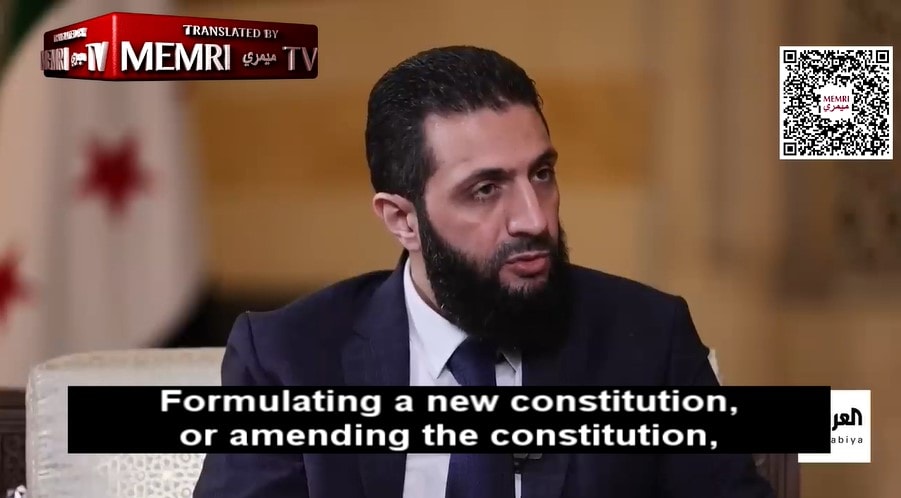
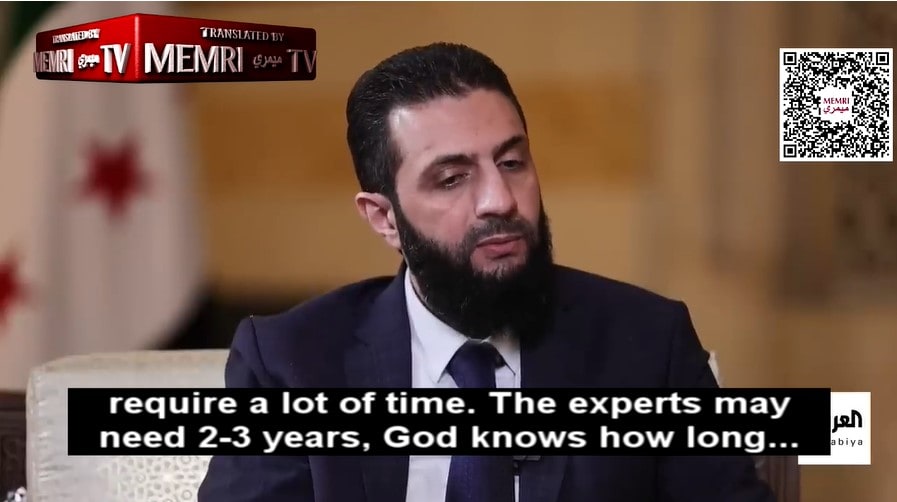
Interviewer: "Two or three years?"
Al-Sharaa: "Yes."
Interviewer: "To write a new constitution?"
Al-Sharaa: "Correct.
[...]
"Formulating a constitution must not be a fast-food job. It should be done with a lot of care, and be subject to inspection. International legal experts need to be consulted, so that this constitution lasts as long as possible. You do not get an opportunity like we have today every 5-10 years. This is a historic junction. We are talking after about 60 years. If you get an opportunity like this every sixty years, you had better establish a constitution that will regulate public life, so that the past does not repeat itself, and Syria does not go back to where it has been in the past 60 years."
Interviewer: "What about the general and presidential elections?"
Al-Sharaa: "That's another thing. The infrastructure for elections in Syria right now is very flawed. We need to rebuild it. More than 15 million Syrians are either displaced or refugees. Most of these people are undocumented. If you asked me what the population of Syria is... Well, nobody knows. A census of the Syrian population will require time.
"The process of making legal contacts with the Syrian communities abroad, through the embassies, in order to document the new births and deaths... People who left at the age of 10 are 24 years old now. We are talking about a widespread situation, and an accurate census of the Syrian people at home and abroad is needed. This requires time."
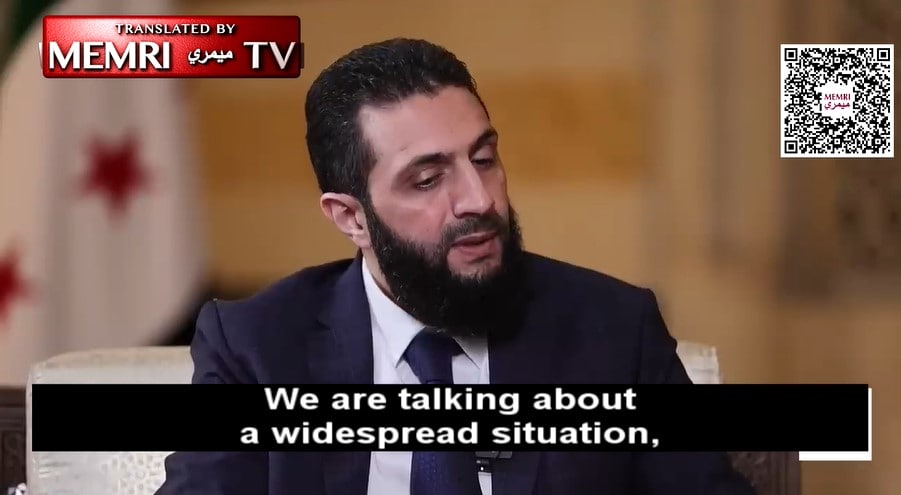
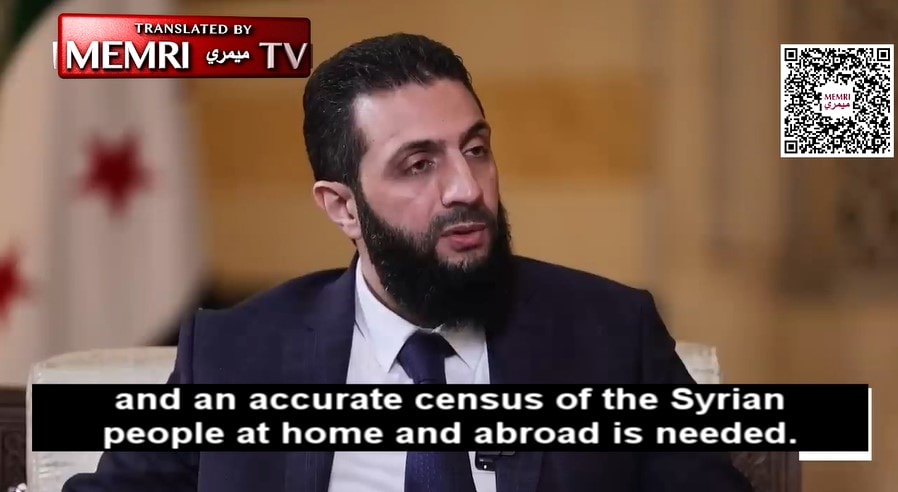
Interviewer: "So the elections could be in four years?"
Al-Sharaa: "Yes. It's possible."
[...]
HTS Will Be Dissolved
Interviewer: "Will HTS be dissolved?"
Al-Sharaa: "Absolutely. You cannot run a state with the mentality of groups and factions. We were morally and psychologically prepared for this even when we were still in Idlib, but there was no adequate opportunity. Running a state is the best opportunity to disband these [groups] and we will be the first to dissolve the HTS."
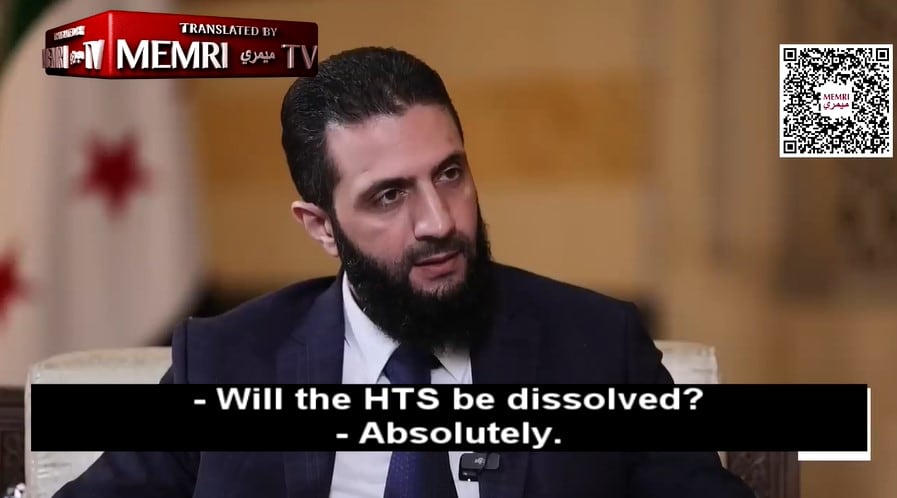
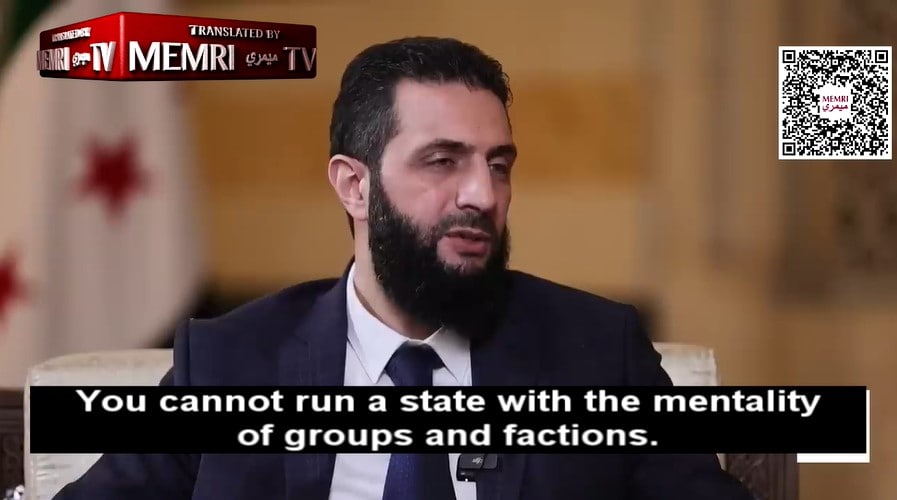
Interviewer: "When do you expect this?"
Al-Sharaa: "I believe that in the conference..."
Interviewer: "This will be announced at the National Dialogue Conference?"
Al-Sharaa: "Yes.
[...]
"[UNSC Resolution] 2254 has an essence and a shell. The essence is the effort to bring back the refugees, and we did this with our military operation. All the Syrian refugees and displaced can safely return anywhere. [Resolution 2254 talks about] the release of prisoners, and we released all the prisoners throughout Syria, saved them from all the tragedies we saw.
"It talks about the peaceful transition of power, and this was also done. The president fled and the government was peacefully transferred to the new rule. So the important parts of the essence of Resolution 2254 have been implemented. The other things in Resolution 2254 cannot be implemented. What are we supposed to do? Write Bashar in Moscow so he can hand over the power to us?
[...]
"The Syrian problem has lasted for 14 years. There has been a lot of suffering and many attempts to fix things in Syria, but the UN and the international community have failed in bringing about the release of a single prisoner, in these 14 years. They have failed to bring back a single refugee, or to persuade the regime to accept even the minimal political solution, even though it served the interests of the regime.
"The Syrian people saved themselves by themselves, so I am asking not to burden them with frozen resolutions, which will only increase their suffering and bring them back to square one. What is the goal? The verbatim implementation of this resolution, or the benefit that was gained from this resolution?
[...]
"We Will Not Allow Syria To Become A Source Of Harassment For Neighboring Countries"
"We will not allow Syria to become a source of harassment for neighboring countries."
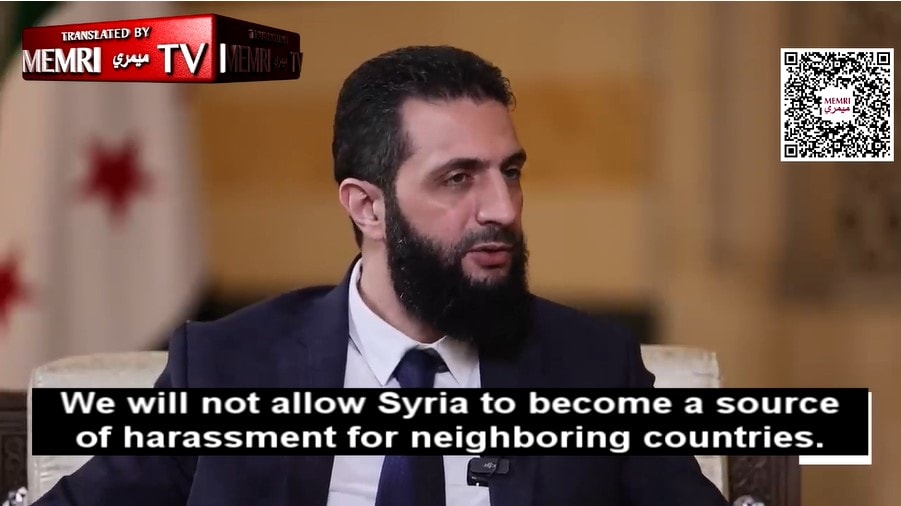
Interviewer: "What about exporting the revolution, in the style of the Iranian revolution?"
Al-Sharaa: "From day one, I declared in the media that the revolution was over as far as we are concerned. We are heading towards building a state."
[...]
Interviewer: "Following the victory of the Syrian revolution, Iran has said that nobody should delude themselves that there is a winner in Syria, and that there would be many developments in Syria in the near future. What is your take on this?"
Al-Sharaa: "Well, I was hoping the Iranians would reconsider their interference in the region, at the expense of the people of the region. With its behavior in Syria, Iran has left many wounds. It was the Iranians who invited the Russians to enter the Syrian fray.
[...]
"I think that this stage requires Iran to reconsider [its positions]. Syria is untenable without relations with a big regional country like Iran, but these relations must be based on diplomatic ties, mutual respect for sovereignty, and avoiding interference in internal affairs."
[...]
Interviewer: "You don't want reparations from Iran and Hizbullah? You don't want them to stand trial?"
Al-Sharaa: "Honestly, I haven't put much thought into it. I would leave it to the legal committees. We are trying to calm things down as much as possible.
[...]
"More importantly, Iran should not consider using Syria again as a platform to attack other countries or inciting unrest there."
[...]
"All Weapons Should Be Held Exclusively By The State[;] We Will Open A Negotiations Track With SDF And Find A Solution Through Dialogue"
Interviewer: "Are things heading towards a solution with the SDF?"
Al-Sharaa: "We addressed all the parties, and said that the problem is Syrian, and we should resolve it internally and try to find a proper solution in northeast Syria, according to some basic principles: There must not be any partition of Syria, and we should not cement the idea of partition in any way, shape, or form – not even in the form of a federation. Our society is still not ready to understand the nature of federations, and it will head for partition under the title of federation.
"Another thing is that there are foreign militants in the northeast, who have problems with neighboring countries. Just like we defend the peace and security of our neighboring countries... Turkey suffers from the PKK and its bombings inside Turkey. We will not allow Syria to become a platform for these attacks.
"The Kurds are part of our people. They were oppressed, just like we were, and it is our duty to protect and defend them, and to let them return to some villages from which they were displaced during the period of the revolution. This is our duty. On the basis of these principles... With regard to the militants in northeast Syria – all the weapons should be held exclusively by the state. Militants who are qualified to join the Ministry of Defense will be welcome there. On the basis of these terms and principles, we will open a negotiations track with SDF, and inshallah, we will find a suitable solution through dialogue."




